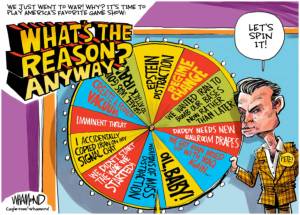Harrop: Pandemic may have grounded ‘snowbirds’ for good
Published 1:30 am Thursday, May 28, 2020
By Froma Harrop / syndicated columnist
When the pandemic hit this winter, city people with second homes moved into them. This upset the rhythm of beach, lake and mountain communities that attract a lot of “summer people,” but not until the summer.
As for winter destinations — Florida, Arizona, Texas or any ski area — the snowbirds seem to be lingering into the spring. Full-time locals may wonder when they will leave. They are going to leave, right?
Off-season was traditionally a time for year-rounders to enjoy less traffic and a calmer scene at restaurants and stores. For those of modest means, it offered respite from the affluent part-time residents with their lust for the best tables and air of permanent leisure.
The question now is whether the coronavirus has messed up the snowbird migration patterns for good. After all, restrictions on gathering remain largely in place in the urban centers, where the second-home people have their first homes. Pleasures of city life have been greatly curtailed.
That seasonal residents tend to have more money than the permanent locals has long raised resentments along socioeconomic lines. The irritation is further inflamed by the belief that city people may be bringing in the virus along with their fancy laptops and single-malt scotches. Meanwhile, small towns and rural areas usually don’t have the medical infrastructure to treat large numbers.
This phenomenon is seen in Europe as well, only with more conflict. As the gentry from Paris surged into their second homes on peaceful French islands off the Atlantic Coast, class tensions flared. The sight of Parisians on seemingly endless vacation — kite surfing, biking and relaxing on the beach — as locals continue their long struggle with economic decline has led to unfriendliness. Tires on cars with Paris plates have been slashed. One mayor tried to block a bridge from the mainland.
Similar scenes have played out in Italy, where residents of the rich but virus-stricken northern cities headed for the country’s poorer south. And when Madrid shut down, urbanites streamed to their homes on Spain’s Mediterranean coast. Some countries, such as Norway and Belgium, forbid people from self-quarantining in their second homes.
That’s a more perilous path here. In late March, Florida Gov. Ron DeSantis tried to set up highway checkpoints to stop cars from New York and Louisiana, two coronavirus hotspots, and order their passengers to self-quarantine for two weeks.
“It’s not fair to the people of Florida,” DeSantis said, that outsiders keep coming in. Thing is, many of those “outsiders” own houses or condos in Florida. Do they get to skip property taxes this time around?
Many residents of the largely abandoned cities, meanwhile, seem to enjoy having the place back to themselves. A restaurant owner in the over-touristed city of Dubrovnik, Croatia, bemoaned the loss of business but likes not having to push his way through cruise ship crowds. From his terrace overlooking the Old Port, he now sees fishing nets laid out to dry instead of tables occupied by swarms of tourists.
A web developer living in Rome talks of enjoying his walks to the uncrowded Spanish Steps. The city has turned “romantic,” he said, “like a dream.”
Well, what happens when our world reopens in earnest? Will the summer people or snowbirds fly back to their primary nests?
The lockdown has demonstrated that many can do their jobs from wherever there’s a good internet connection. If remote work becomes more permanent, second-home people may have even less of an incentive to leave.
Will second homes turn into primary residences? The summer people will probably hang on through the warm weather. Look to the snowbirds, right now, for a hint of an answer.
Follow Froma Harrop on Twitter @FromaHarrop. Email her at fharrop@gmail.com.


